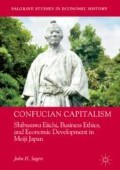Abstract
The chapter focuses on efforts to keep Shibusawa Eiichi’s message of Confucian capitalism in public discourse. Eiichi’s grandson Shibusawa Keizo had a scholarly interest in cultural preservation, which contributed greatly to the collection and publication of Eiichi’s papers. The Dragon Gate Society (Ryumonsha), later renamed the Shibusawa Eiichi Memorial Foundation, maintains a museum and organizes seminars devoted to discussions of business ethics. Critics argue that the “Japan, Inc.” model of Japanese capitalism that Shibusawa helped create has now become an obstacle to progress. However, Shibusawa’s optimistic strategy of building networks of talented and innovative entrepreneurs with an ethical sense of mission is still attractive to those who hope to bring about needed reforms in both politics and business.
Access this chapter
Tax calculation will be finalised at checkout
Purchases are for personal use only
References
Allinson, Gary D. 1987. Japan’s Keidanren and Its New Leadership. Pacific Affairs 60 (3): 385–407. https://doi.org/10.2307/2758880.
Bygrave, William D. 1997. The Portable MBA in Entrepreneurship. New York: Wiley.
Chikudate, Nobuyuki. 2002. Collective Myopia and Disciplinary Power behind the Scenes of Unethical Practices: A Diagnostic Theory on Japanese Organization. Journal of Management Studies 39 (3): 289–307.
Hirai, Yuichiro, and Tomokazu Takada, eds. 2014. Kioku to Kiroku No Naka No Shibusawa Eiichi. Shohan ed. Tokyo: Hosei Daigaku Shuppankyoku.
Hurst, Daniel. 2018. Japan Cronyism Scandal Linked to Shinzo Abe and Wife Worsens with Suicide Note. The Guardian. http://www.theguardian.com/world/2018/mar/16/japan-cronyism-scandal-linked-to-shinzo-abe-and-wife-worsens-with-suicide-note
Ibata-Arens, Kathryn C. 2005. Innovation and Entrepreneurship in Japan: Politics, Organizations, and High Technology Firms. New York: Cambridge University Press.
Institute for the Study of Japanese Folk Culture. 2018. Keizo Shibusawa and the Attic Museum. http://jominken.kanagawa-u.ac.jp/en/about/03.html
Johnson, Chalmers. 1982. MITI and the Japanese Miracle: The Growth of Industrial Policy, 1925–1975. Stanford: Stanford University Press.
Katagiri, Nobuo. 1999. Gaikan 91 Nen no Shogai to Sono Jiseki. In Koeki no Tsuikyusha Shibusawa Eiichi: Shinjidai no Sozo, 3–24. Tokyo: Yamakawa Shuppansha.
Latz, Gil, ed. 2014. Rediscovering Shibsawa Eiichi in the Twenty-First Century. Tokyo: Shibusawa Eiichi Memorial Foundation.
Lawson, Inc. 2007. Annual Report 2007. Tokyo: Lawson, Inc. http://www.lawson.co.jp/.
Lincoln, Edward J. 2001. Arthritic Japan: The Slow Pace of Economic Reform. Washington, DC: Brookings Institution Press.
Morikawa, Hidemasa. 1976. Shibusawa Eiichi—Nihon Kabushiki Gaisha No Soritsusha. In Nihon No Kigyo to Kokka, Nihon Keieishi Koza, vol. 4. Tokyo: Nihon Keizai Shimbunsha.
Obata, Kyugoro. 1938. An Interpretation of the Life of Viscount Shibusawa. Tokyo: Zaidan Hojin Shibusawa Sei-en o Kinen Kai.
Ryumonsha, ed. 1955. Shibusawa Eiichi Denki Shiryo. 58 vols. 10 supplementary vols. Tokyo: Shibusawa Eiichi Denki Shiryo Kankokai.
Sano, Shin’ichi. 1998. Shibusawa-ke Sandai. Tokyo: Bungei Shunju.
Shi, Lili, and Akiyoshi Yonezawa. 2012. Innovation and Entrepreneurship: Trials of Japanese Universities. Globalisation, Societies and Education 10 (3): 367–385.
Webber, Alan M. 1992. Japanese-Style Entrepreneurship: An Interview with Softbank’s CEO, Masayoshi Son. Harvard Business Review, February.
Wilson, William T. 2015. Japan Needs Real Economic Reform. 163. Special Report. Washington DC: Heritage Foundation. http://report.heritage.org/sr163.
Yamamura, Kozo. 1974. Study of Samurai Income and Entrepreneurship. Cambridge, MA: Harvard University Press.
Author information
Authors and Affiliations
Rights and permissions
Copyright information
© 2018 The Author(s)
About this chapter
Cite this chapter
Sagers, J.H. (2018). Purposeful Preservation of Shibusawa Eiichi’s Legacy. In: Confucian Capitalism. Palgrave Studies in Economic History. Palgrave Macmillan, Cham. https://doi.org/10.1007/978-3-319-76372-9_8
Download citation
DOI: https://doi.org/10.1007/978-3-319-76372-9_8
Published:
Publisher Name: Palgrave Macmillan, Cham
Print ISBN: 978-3-319-76371-2
Online ISBN: 978-3-319-76372-9
eBook Packages: Economics and FinanceEconomics and Finance (R0)

